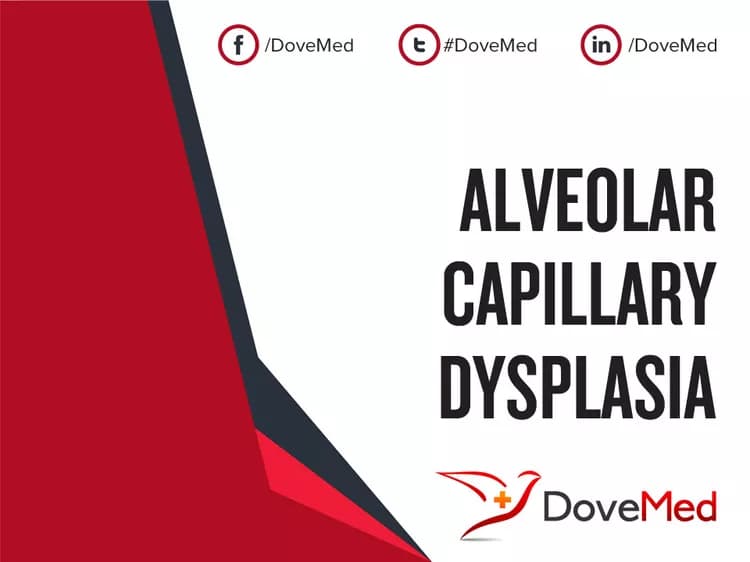What are the other Names for this Condition? (Also known as/Synonyms)
- Misalignment of the Pulmonary Veins
- Congenital Alveolar Dysplasia
What is Alveolar Capillary Dysplasia? (Definition/Background Information)
- Alveolar capillary dysplasia (ACD) is a rare, congenital disorder characterized by the lack of formation of the air-blood diffusion barrier in the lungs.
- When individuals suffer from ACD, the alveoli in the lungs cannot uptake oxygen as efficiently due to a lack of development. This prevents oxygen from entering the bloodstream and traveling through the body and thus prevents the expelling of carbon dioxide.
- The symptoms of ACD become fatal within minutes to hours of birth. Without a lung transplant, infants are not expected to live past their first year of life.
Who gets Alveolar Capillary Dysplasia? (Age and Sex Distribution)
- Alveolar capillary dysplasia is a genetic disorder. It can occur in males and females and is apparent from birth.
- Currently, only 200 cases of ACD have been known to exist worldwide.
What are the Risk Factors for Alveolar Capillary Dysplasia? (Predisposing Factors)
Common risk factors of alveolar capillary dysplasia include:
- Trauma or damage during early fetal development
- Family history (in rare cases)
It is important to note that having a risk factor does not mean that one will get the condition. A risk factor increases ones chances of getting a condition compared to an individual without the risk factors. Some risk factors are more important than others.
Also, not having a risk factor does not mean that an individual will not get the condition. It is always important to discuss the effect of risk factors with your healthcare provider.
What are the Causes of Alveolar Capillary Dysplasia? (Etiology)
- Alveolar capillary dysplasia is caused by mutations in the FOXF1 gene.
- The FOXF1 protein that this gene codes for is important in lung development, blood vessel development in the lungs, and development of the gastrointestinal tract. When mutations are present, the protein is not properly synthesized and development does not properly occur.
- The FOXF1 gene is located on the long arm of chromosome 16. Research has found that deletions in the 16q24.1 region, which includes the region of the FOXF1 gene, cause ACD to manifest. This indicates that other genes are likely involved in ACD.
What are the Signs and Symptoms of Alveolar Capillary Dysplasia?
Common signs and symptoms of alveolar capillary dysplasia include:
- Shortness of breath
- Cardiac dysfunction
- Low blood oxygenation
- Blue skin
- Pulmonary hypertension (high blood pressure)
- Twisting of the intestines
- Respiratory distress
How is Alveolar Capillary Dysplasia Diagnosed?
- Most cases of alveolar capillary dysplasia are diagnosed postmortem. Almost all infants who suffer from ACD die within one year of birth. Due to the extreme symptoms that characterize ACD, most do not survive past a few weeks of birth.
- Postmortem, lung biopsies are conducted to confirm the diagnosis.
- A diagnosis of ACD can also be made prenatally. During gestation, a prenatal test can be done that looks at the DNA of the fetus to determine if mutations are present.
Many clinical conditions may have similar signs and symptoms. Your healthcare provider may perform additional tests to rule out other clinical conditions to arrive at a definitive diagnosis.
What are the possible Complications of Alveolar Capillary Dysplasia?
- Fatal complications can arise as a result of alveolar capillary dysplasia. These can include multi-organ failure, lung cancer, and in many cases, infant death.
- Hypothyroidism can also result from ACD.
- Blood poisoning is another common complication of ACD. When adequate oxygen does not reach the blood, it can be poisoned and result in further complications.
How is Alveolar Capillary Dysplasia Treated?
- Due to the genetic nature of alveolar capillary dysplasia, no treatment options exist to cure it. Instead, treatment is provided that eases the symptoms of the disorder. These include:
- Nitric oxide
- Lung transplant
- Extracorporeal membrane oxygenation (ECMO) - provides cardiac and respiratory oxygen support
How can Alveolar Capillary Dysplasia be Prevented?
- No known preventative measures exist against alveolar capillary dysplasia. As ACD is caused by genetic mutations, it is difficult to take precautionary measures against it.
What is the Prognosis of Alveolar Capillary Dysplasia? (Outcomes/Resolutions)
- The life expectancy of infants with alveolar capillary dysplasia is low. Most individuals do not survive past the age of one.
Additional and Relevant Useful Information for Alveolar Capillary Dysplasia:
The following DoveMed website link is a useful resource for additional information:
https://www.dovemed.com/diseases-conditions/congenital-genetic-disorders/
Related Articles
Test Your Knowledge
Asked by users
Related Centers
Related Specialties
Related Physicians
Related Procedures
Related Resources
Join DoveHubs
and connect with fellow professionals


0 Comments
Please log in to post a comment.